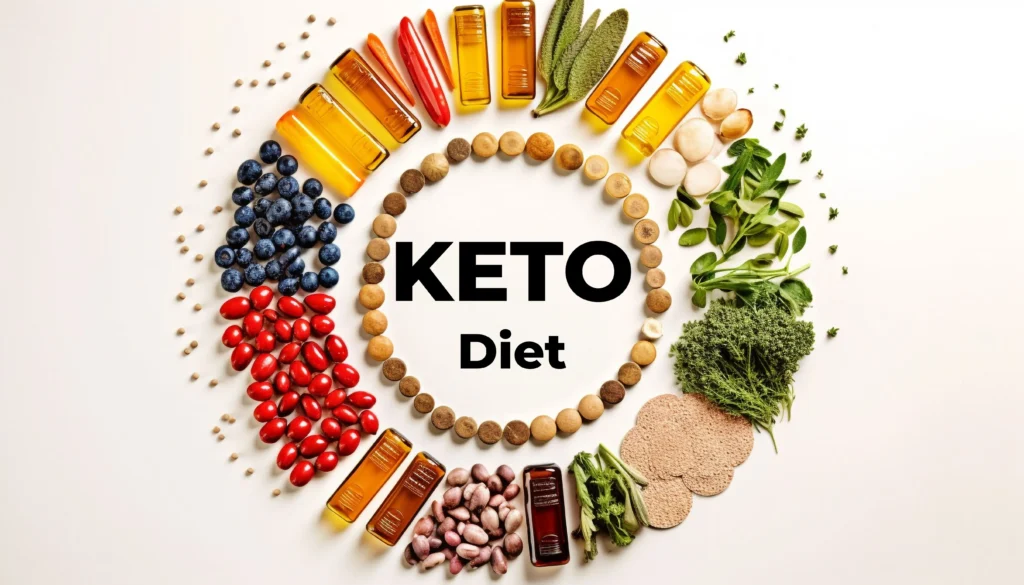Introduction:
“Unlocking Rapid Fat Loss: A Comprehensive Guide” serves as your essential resource for achieving rapid and sustainable fat loss. This guide is crafted to provide unique insights into nutrition, exercise, mindset, and lifestyle choices, offering a comprehensive approach to navigate the intricacies of your fat loss journey. Join us as we explore evidence-based strategies and practical tips to unlock rapid and enduring results.
Nutrient-Rich Diet: The Core of Rapid Fat Loss

At the heart of any effective fat loss strategy lies a well-balanced and nutrient-rich diet. Instead of succumbing to extreme diets or deprivation, focus on providing the body with essential nutrients. Incorporate lean proteins, healthy fats, complex carbohydrates, and a diverse array of vitamins and minerals to fuel the metabolism and support fat-burning mechanisms.
A diet rich in nutrients forms the cornerstone of rapid fat loss, serving as a fundamental element in achieving quick and sustainable results. This nutritional approach focuses on providing the body with essential components necessary for optimal functioning, metabolism, and effective fat-burning. Let’s delve into why a nutrient-rich diet is pivotal for those aiming to shed excess fat rapidly:
- Metabolic Efficiency: Nutrient-dense foods, encompassing lean proteins, whole grains, fruits, vegetables, and healthy fats, supply the vital vitamins and minerals required to support the body’s metabolic processes. An efficiently functioning metabolism is essential for converting food into energy and managing weight effectively.
- Satiety and Craving Control: Nutrient-rich foods are known for their satiating properties, keeping individuals feeling full and satisfied for extended periods. This inherent quality aids in reducing overall calorie intake by minimizing snacking and preventing overeating, contributing significantly to fat loss.
- Preservation of Lean Muscle: Adequate protein intake from nutrient-rich sources is crucial for preserving lean muscle mass during the fat loss journey. Maintaining muscle mass is imperative, as muscles contribute to a higher resting metabolic rate, facilitating the burning of more calories even at rest.
- Blood Sugar Regulation: Whole foods, especially complex carbohydrates from whole grains and fiber-rich fruits and vegetables, assist in regulating blood sugar levels. Stable blood sugar levels support sustained energy levels, preventing energy crashes and the subsequent cravings for sugary or high-calorie snacks.
- Nutrient Density Prevails Over Caloric Density: Nutrient-dense foods offer a high concentration of essential nutrients relative to their calorie content. Opting for foods with high nutrient density ensures maximum nutritional value from meals, promoting overall health while aiding in fat loss.
- Hormonal Harmony: Nutrients play a pivotal role in regulating hormones associated with metabolism and fat storage. For instance, sufficient intake of omega-3 fatty acids, found in foods like fatty fish and flaxseeds, positively influences hormones related to fat metabolism.
- Holistic Health Benefits: Beyond the immediate goal of fat loss, a nutrient-rich diet contributes to overall health and well-being. It prevents nutritional deficiencies, bolsters the immune system, and diminishes the risk of chronic diseases, laying the groundwork for a sustainable and healthy lifestyle.
In essence, a nutrient-rich diet offers the body the essential elements needed for optimal functioning. It not only supports rapid fat loss by fostering a healthy metabolism and minimizing cravings but also promotes overall well-being and long-term health.
High-Intensity Interval Training (HIIT): Optimizing Efficiency

When it comes to exercise, High-Intensity Interval Training (HIIT) emerges as a potent tool for rapid fat loss. HIIT involves brief, intense bursts of exercise followed by short periods of rest or lower-intensity activity. This not only burns calories during the workout but also elevates the metabolism, leading to prolonged fat-burning effects.
Hydration: The Often Overlooked Element

Water’s role in fat loss is frequently underestimated. Staying adequately hydrated is vital for supporting metabolic functions, aiding digestion, and regulating appetite. Drinking water before meals can create a sense of fullness, reducing the likelihood of overeating.
Hydration, a frequently underestimated factor in the realm of health and fitness, plays a vital role in overall well-being and holds particular importance for individuals pursuing fitness goals, including fat loss. Below is an explanation of why hydration often goes unnoticed and why it is a critical component of any successful health and fitness strategy:
- Support for Metabolic Processes: Proper hydration is crucial for supporting the body’s metabolic processes. Water is a key participant in various biochemical reactions that contribute to nutrient breakdown and energy production. Maintaining adequate hydration ensures the efficiency of these metabolic processes, promoting overall metabolic health.
- Appetite Management: Dehydration can sometimes be misinterpreted by the body as hunger, potentially leading to unnecessary calorie consumption. Consuming water before meals creates a sense of fullness, aiding in appetite control and preventing overeating. This aspect is especially relevant for individuals on a fat loss journey as it helps manage overall caloric intake.
- Temperature Regulation during Exercise: Effective thermoregulation during physical activity relies on adequate hydration. Dehydration can compromise the body’s ability to cool itself through sweating, increasing the risk of heat-related issues and impairing exercise performance.
- Cognitive Function: Dehydration has the potential to negatively impact cognitive function, including concentration, alertness, and short-term memory. Maintaining proper hydration is crucial for mental clarity and focus, essential for making informed decisions related to nutrition, exercise, and overall well-being.
- Maintenance of Electrolyte Balance: Electrolytes such as sodium, potassium, and chloride are vital for various physiological functions, including muscle contractions and nerve impulses. Hydration supports the balance of electrolytes in the body, ensuring optimal cellular function, which is particularly important for individuals participating in activities leading to electrolyte loss through sweat.
- Joint and Muscle Well-being: Water constitutes synovial fluid, essential for lubricating joints and facilitating smooth movement. Adequate hydration is necessary for joint health, preventing stiffness or discomfort, especially for those regularly engaging in exercise.
- Skin Health: Proper hydration contributes to skin elasticity and overall appearance. Dehydrated skin may appear dry and lackluster. Maintaining optimal hydration levels promotes a healthy complexion, serving as an additional incentive for individuals working towards fitness and fat loss objectives.
- Toxin Elimination: Hydration facilitates the elimination of waste products and toxins through urine. Proper hydration supports kidney function, preventing the accumulation of waste substances and contributing to overall detoxification.
In summary, while frequently overlooked, hydration is a fundamental and multifaceted element influencing various aspects of health and fitness. Consistent and sufficient water intake in daily routines is essential for supporting metabolism, managing appetite, enhancing exercise performance, preserving cognitive function, balancing electrolytes, maintaining joint and muscle health, promoting skin appearance, and facilitating toxin elimination. Recognizing the significance of hydration can significantly enhance overall well-being and contribute to the success of fitness and fat loss endeavors.
Quality Sleep: The Silent Catalyst for Fat Loss

Quality sleep is a critical yet often disregarded factor in rapid fat loss. Poor sleep disrupts hormonal balance, leading to increased cravings for unhealthy foods and a slower metabolism. Aim for 7-9 hours of quality sleep per night to optimize the body’s fat-burning potential.
Quality sleep is often described as the “silent catalyst” for rapid fat loss due to its pivotal role in fostering a healthy metabolism, controlling appetite, and promoting overall well-being. Here’s an explanation of why quality sleep is essential in the quest for rapid fat loss:
- Hormonal Harmony: Sleep profoundly influences hormonal regulation, particularly concerning appetite and metabolism. Insufficient sleep disrupts the balance of hormones such as leptin and ghrelin, responsible for managing hunger and fullness. This hormonal imbalance can lead to heightened cravings for calorie-dense foods and a compromised ability to make healthy dietary choices.
- Metabolic Efficiency: Quality sleep is vital for the proper functioning of the body’s metabolic processes. rapid During deep sleep, the body undergoes essential repair and regeneration, optimizing metabolic functions, including glucose regulation and insulin sensitivity. Inadequate sleep can negatively impact these processes, potentially resulting in weight gain and impeding fat loss.
- Energy Expenditure: Adequate sleep contributes to overall energy expenditure. Well-rested individuals tend to have increased energy levels throughout the day, promoting engagement in physical activities and workouts. Elevated physical activity enhances calorie burn, aiding in the pursuit of fat loss.
- Lean Muscle Preservation: Quality sleep plays a crucial role in preserving lean muscle mass. During deep sleep, the body releases growth hormone, a key factor in muscle repair and growth. Preserving lean muscle mass is integral for maintaining a higher resting metabolic rate, facilitating increased calorie burning even during periods of rest.
- Stress Management: Lack of sleep can elevate stress levels, triggering the release of cortisol, commonly known as the stress hormone. Elevated cortisol levels can lead to increased fat storage, particularly in the abdominal region. Quality sleep contributes to effective stress management, helping to maintain healthier body composition.
- Appetite Regulation: Sleep deprivation can disrupt the body’s ability to regulate appetite. It often results in an increase in ghrelin, the hunger-stimulating hormone, and a decrease in leptin, the hormone signaling fullness. This hormonal imbalance may lead to overeating and poorer dietary choices, hindering progress in fat loss.
- Mental Resilience: Quality sleep is crucial for mental resilience and discipline. Fatigue and sleep deprivation can impair decision-making processes and weaken the determination to adhere to a healthy lifestyle, encompassing dietary choices and regular exercise.
In conclusion, quality sleep serves as a silent catalyst for rapid fat loss by influencing hormonal balance, supporting metabolic functions, enhancing energy expenditure, preserving lean muscle mass, managing stress, regulating appetite, and promoting mental resilience. Prioritizing sufficient and restful sleep is foundational in a comprehensive fat loss strategy, working in synergy with other lifestyle factors to achieve optimal results.
Positive Mindset: The Mental Facet of Fat Loss

The mind-body connection plays a pivotal role in fat loss. Cultivate a positive mindset, set realistic goals, and acknowledge small victories. Stress management techniques, including meditation and mindfulness, can enhance overall well-being and support the fat loss process.
A positive mindset plays a pivotal role in the mental aspect of fat loss, influencing behaviors, choices, and overall success in achieving health and fitness goals. This mental facet involves fostering optimistic thoughts, setting realistic goals, and maintaining a constructive attitude throughout the fat loss journey. Below is an explanation of why cultivating a positive mindset is integral to the mental aspect of fat loss:
- Motivation and Commitment: A positive mindset serves as a driving force, fueling motivation and commitment. Approaching fat loss goals with optimism encourages individuals to stay dedicated to their fitness and nutrition routines. This motivation becomes a crucial factor in overcoming challenges and setbacks, fostering resilience in the face of obstacles.
- Goal Setting and Visualization: Setting achievable goals is fundamental to successful fat loss. A positive mindset encourages individuals to set realistic goals that are challenging yet attainable. Utilizing visualization, a technique often associated with positive thinking, helps individuals imagine their success, reinforcing the belief that their goals are within reach.
- Reduced Stress and Emotional Eating: Stress and negative emotions can contribute to emotional eating, hindering progress in fat loss. Maintaining a positive mindset helps individuals cope with stress effectively, reducing the likelihood of turning to food for comfort. Positive thinking encourages the adoption of healthier coping mechanisms, such as engaging in physical activity or practicing mindfulness.
- Consistent Habits and Routine: A positive mindset fosters the development of consistent, healthy habits. Viewing the fat loss journey as an opportunity for positive change, individuals are more likely to adopt sustainable habits related to nutrition and exercise. Consistent habits are key to long-term success in fat loss.
- Resilience in the Face of Setbacks: Fat loss journeys often involve setbacks, and a positive mindset enhances resilience. Individuals with a positive outlook bounce back from setbacks without losing sight of their overall goals. Rather than viewing setbacks as failures, they see them as opportunities for learning and growth.
- Enhanced Self-Efficacy: Positive thinking contributes to increased self-efficacy—the belief in one’s ability to accomplish tasks and overcome challenges. As individuals experience small victories and positive changes, their confidence grows. This self-assurance becomes a powerful factor in sustaining long-term fat loss efforts.
- Improved Body Image and Self-Love: A positive mindset fosters a healthier relationship with one’s body. Going beyond a focus on physical appearance, individuals with a positive mindset develop self-love and acceptance. This shift in perspective contributes to a more sustainable and positive approach to fat loss, emphasizing overall well-being.
- Enjoyment in the Process: A positive mindset encourages individuals to find joy in the journey rather than solely fixating on the end goal. When people enjoy the process of adopting a healthier lifestyle, including nutritious eating and regular exercise, they are more likely to adhere to these habits in the long term.
In summary, a positive mindset is a crucial mental component in the fat loss journey, influencing motivation, goal setting, stress management, consistency, resilience, self-efficacy, body image, and overall enjoyment of the process. Cultivating a positive mindset not only contributes to achieving fat loss goals but also fosters a sustainable and healthy approach to life.
Consistency and Patience: The Long-Term Perspective

While the aim is rapid fat loss, it’s crucial to recognize the importance of sustainability. Consistently practice healthy habits over time for enduring results. Avoid the allure of quick fixes and extreme measures, focusing on establishing a lifestyle conducive to well-being in the long run.
Consistency and patience are foundational virtues crucial to the pursuit of rapid fat loss. These qualities play a pivotal role in establishing sustainable habits, navigating challenges, and achieving lasting success. Here’s an explanation of why consistency and patience are essential elements in the journey of rapid fat loss:
- Cultivating Sustainable Habits: Consistency involves committing to a set of behaviors and routines over time. The establishment of sustainable habits is paramount in rapid fat loss because quick fixes or extreme measures often result in temporary outcomes. Consistently making health-conscious food choices, engaging in regular exercise, and prioritizing sufficient sleep form the bedrock for enduring success.
- Gradual Adaptation and Avoidance of Extremes: Rapid and sustainable fat loss necessitates gradual adaptation to new habits. Extreme dieting or intense exercise regimens may yield immediate results but are challenging to maintain. Consistency calls for making gradual changes that allow the body and mind to adapt over time, ensuring a more balanced and enduring approach.
- Preventing Yo-Yo Dieting: Consistency is a deterrent to the cycle of yo-yo dieting, where individuals experience rapid weight loss followed by regain. Sustainable fat loss entails adopting lifestyle changes that can be maintained in the long run. Patience is crucial in allowing the body to adjust steadily, averting the pitfalls of drastic weight fluctuations.
- Building a Robust Foundation: Consistency builds a robust foundation for fat loss by reinforcing positive behaviors. Regular exercise, mindful eating, and ample sleep become integral components of an individual’s lifestyle. This foundation supports not only fat loss but also overall well-being, contributing to a healthier and more balanced life.
- Adapting to Individual Needs: Recognizing individual uniqueness is essential, as what works for one may not work for another. Consistency enables individuals to experiment with different approaches, tailoring their fat loss journey to individual needs. Patience is crucial as adjustments are made to find the most effective and sustainable strategy.
- Mitigating Burnout: Consistency involves pacing oneself to avoid burnout. Overly restrictive diets or strenuous workout regimens can lead to fatigue and diminished motivation. Patience is necessary, understanding that results take time, and a balanced approach is more likely to yield sustainable outcomes.
- Cultivating Psychological Resilience: Consistency and patience contribute to psychological resilience. Fat loss journeys often encompass setbacks, plateaus, or slower-than-expected progress. Maintaining consistent effort and practicing patience during challenging times help individuals stay focused on long-term goals without succumbing to discouragement.
- Ensuring Long-Term Success: Rapid fat loss is not merely about achieving short-term objectives but sustaining those results over time. Consistency and patience play a pivotal role in long-term success. Adhering consistently to healthy habits and exercising patience during plateaus or slower phases ensures that the achieved results are maintainable and enduring.
In summary, consistency and patience are indispensable virtues in the pursuit of rapid fat loss. These qualities facilitate the establishment of sustainable habits, gradual adaptation, avoidance of extremes, building a strong foundation, adapting to individual needs, mitigating burnout, cultivating psychological resilience, and ensuring long-term success. Embracing these virtues creates a holistic and enduring approach to achieving and maintaining rapid fat loss.
Conclusion:
In conclusion, the key to rapid fat loss lies in a combination of a balanced diet, effective exercise, hydration, quality sleep, a positive mindset, and a commitment to long-term consistency. Embrace these elements to unlock a healthier, leaner self. The journey may be swift, but the real secret lies in making it sustainable for lasting success.




